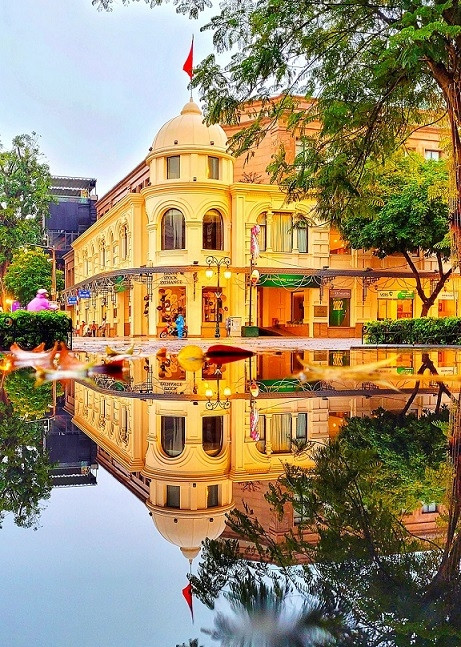Traveling to experience other cultures or visiting sites of historical and religious significance has always been a compelling motivation to hit the road.
On the occasion of Hung King’s Day this year, Booking.com reveals the top five most recommended historic destinations in the nation as chosen by Vietnamese travelers for historic sites.
The thousand-year-old Hanoi Capital

“What makes Hanoi the go-to destination for travelers is the perfect balance it strikes between history, culture, and modernity,” according to Booking.com.
Oozing with charm, character, and continued cultural evolution, the capital city of Vietnam has no shortage of historic landmarks. These include the Temple of Literature and National University, Hoa Lo Prison, Ho Chi Minh Mausoleum, St. Joseph’s Cathedral, Imperial Citadel of Thang Long, and countless pagodas and temples scattered around the city.
“Furthermore, just a two-hour drive to the North will take you to Phu Tho Province, where the Hung King’s Temple Festival takes place, which is perfect for a one or two-day trip out of Hanoi so you can take part in one of the most important historical and cultural events in Vietnam,” it suggested.
For Wendy Lee, a Korean expat in Hanoi, the capital of Vietnam is a fascinating blend of old and new, European and Asian, and chaos and order.
“The most attractive things in Hanoi are the city’s layers of history and the blend of cultures. The bustling streets of the Old Quarter filled with motorcycles and lined with tiny restaurants and shops,” she told The Hanoi Times.
According to her, Hanoi is completely different from the capital cities of Japan, Korea, China, and Hong Kong- the places that she used to travel to.
“At first, the biggest difference is that Hanoi is an unsettling city where its appearance can change day by day”. “It could take years to fully explore the city,” she went on to conclude.
Besides the historical sites, there are also plenty of wonderful local dishes that travelers should try such as pho (Vietnamese traditional noodle soup with beef or chicken), bun cha (grilled pork with fresh rice noodles), and Ca phe trung (egg coffee), according to Wendy.
“The Lost Imperial City” of Hue
Located in the center of Vietnam, Hue city was once the nation's capital, a cultural and political center of the country. According to Booking.com, the ‘forgotten kingdom’ is a must-visit destination for any heritage-loving traveler. “It is home to countless historical treasures, consisting of royal mausoleums, the imperial citadel, sophisticated temples, and pagodas,” it wrote.
In fact, the appeal of Hue is the famous Imperial City and tombs of emperors such as Khai Dinh, Tu Duc, and Minh Mang, which are not only iconic relics of the Nguyen dynasty but also architectural masterpieces.
More religious sites for a spiritual retreat include Huyen Tran Princess Temple, Thien Mu Pagoda, Tiger Arena, and Voi Re Temple. Your experience would be enhanced by going on a Huong Riverboat ride, exploring the Hue Royal Theater, taking part in the Hue Festival, or trying out Hue Royal Banquet dinner on a cruise along the iconic Perfume River.
Hoi An- home of wonderful ancient architectures
Redolent of the bygone port-life era, the ancient town of Hoi An is a heritage that many domestic and international travelers hold dear to their hearts.
For Phung Thang, a Hanoi-based architect, Hoi An is not just an attractive tourist destination but his inspiration for work. “I usually visit this ancient town whenever I feel depressed. Seeing the beautiful old architecture and indulging myself in the slow pace of life here gives me more energy for life and work,” he told The Hanoi Times.
The fact is that, with origins tracing back two millennia before it became an important commercial port in the 15th and 16th centuries, Hoi An is home to over a thousand timber-frame buildings, traditional pagodas, ancient clan houses, and hundreds-years-old shophouses that will take you down the memory lane.
Booking.com recommended travelers heritage sites here that they can visit on their own feet. “Occasionally stopping at handicraft workshops stores and villages to take in the serenity of it all. Finally, take a quick tour to the temple ruins of My Son to explore one of the most important Cham sites in Vietnam,” it suggested.
Con Dao Island- a great testimony of history
“There’s frankly nothing quite like Con Dao Island, where rugged mountains covered in dense forest meet turquoise water fringed by coral reefs, where sublime nature tangles with history,” the accommodation booking platform stated.
Used as a prison up until 1975, the island has become a major pilgrimage for Vietnamese travelers to pay their respect to the prisoners and revolutionaries, such as the national martyr Vo Thi Sau (1933-1952).
Taking a visit to Con Dao Museum and several prisons to see remnants of a formative chapter in Vietnam’s history and learn about the stories behind past lives of the brave, patriotic, selfless convicts is a crucial history primer for anyone. Con Dao’s remote location, rich historical values, modest tourism and breathtaking scenery offer travelers a unique experience like nothing else in the country.
Ho Chi Minh City - the illustrious vestige of the Vietnamese people against the US War 1954-1975
With citizens moving here frequently and visitors coming in droves, Ho Chi Minh City, dearly called Saigon, is the largest and most exciting metropolis in Vietnam because it harbors endless opportunities for fun and exploration.
Travel experts suggest you take a step back from its infamous restless nightlife and hectic pace of life, and you’ll find yourself amazed with various historic sites – from the Reunification Palace giving visitors a glimpse into the 1960s and the War Remnants Museum reflecting horrors of the past to the French-colonial architectural heritage buildings like Duc Ba Church.
Source: Hanoitimes